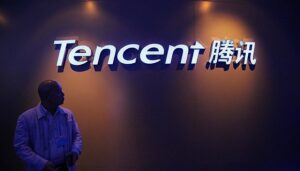Tencent Holdings reported a revenue of 660.26 billion yuan for 2024, rising by 8% year-on-year, and net profit reached 194.07 billion yuan, surging by 68%. Non-IFRS net profit reached 222.7 billion yuan, a year-on-year increase of 41%.
For Q4 alone, the company recorded a revenue of 172.45 billion yuan, a year-on-year increase of 11%, and net profit reached 51.324 billion yuan, an increase of 90%.
The annual gross margin increased to 53%, significantly higher than the 48% in 2023, mainly driven by strong growth in high-margin businesses such as domestic market games, WeChat Channels, and WeChat Search.
Three Major Business Segments See Comprehensive Growth
Tencent’s revenue from value-added services reached 319.2 billion yuan last year, a 7% year-on-year increase.
Among them, international market games performed strongly, with revenue reaching 58 billion yuan, a 9% growth, driven by the strong performance of PUBG MOBILE and Supercell games. Domestic market game revenue grew by 10% to 139.7 billion yuan, with new games like Dungeon & Fighter: Origin and Delta Force becoming new growth points.
Notably, Tencent expanded its evergreen game portfolio, increasing from 12 titles in 2023 to 14 titles in 2024. This strategy of focusing on long-lifecycle games with stable returns provides the company with continuous cash flow support.
The revenue from marketing services reached 121.4 billion yuan in 2024, a 20% year-on-year increase, making it the fastest-growing business segment. The impressive performance was mainly driven by strong demand from advertisers for WeChat Channels, Mini Programs, and WeChat Search advertising inventory, along with AI-driven upgrades to its advertising technology platform.
Advertising spending in industries like gaming, e-commerce, education, and internet services saw significant increases. Tencent’s competitiveness in mobile advertising continues to strengthen, particularly through the use of AI technology to enhance ad targeting accuracy.
The revenue from FinTech and enterprise services reached 212 billion yuan in 2024, a 4% year-on-year increase, with FinTech revenue growth mainly driven by increases in wealth management and commercial payment services, and enterprise service revenue boosted by growth in WeCom and merchant technical service fees.
Notably, the gross margin for this segment increased significantly from 40% to 47%, indicating significant progress in cost control and business efficiency.
The combined monthly active users of WeChat and WeCom reached 1.385 billion, a 3% year-on-year increase. The company enhanced user engagement and transaction capabilities by launching WeChat Mini Stores, providing indexed and standardized product trading experiences.
Capital Expenditure Hits Record High, AI Investment to Increase Further
Tencent’s AI strategy has entered a phase of heavy investment. In 2024, research and development (R&D) expenditure reached 70.69 billion yuan, bringing the total R&D investment over the past seven years to 391.2 billion yuan.
Its capital expenditures have achieved triple-digit year-on-year growth for four consecutive quarters, with annual capital expenditure surpassing 76.7 billion yuan, a year-on-year increase of 221%, setting a new record high. In Q4 alone, capital expenditure reached 36.58 billion yuan, a year-on-year growth of 386% and a quarter-on-quarter rise of 114%.
Against the backdrop of increasing investment in AI, Tencent has accelerated AI penetration across all its products based on its “self-developed + open-source” multi-model strategy. Tencent has launched its self-developed “Hunyuan” large model with Hunyuan T1 and Turbo S, which have been integrated into over 700 internal scenarios. In terms of ecosystem collaboration, products such as Tencent Yuanbao, WeChat, iMA, and Tencent Docs have all integrated the DeepSeek-R1 open-source model in bulk, providing users with a high-quality AI experience.
“Months ago, we reorganized our AI team to focus on rapid product innovation and deep model development. We increased our capital expenditures related to AI and ramped up our R&D and marketing efforts for native AI products,” said Ma Huateng, Chairman and CEO of Tencent.
“We believe these increased investments will yield continuous returns by improving the efficiency of our advertising business and extending the lifecycle of our games, creating long-term value as we accelerate the adoption of personal AI applications and more enterprises adopt our AI services.”
Plans to Repurchase At Least HK$80 Bn Shares
In 2024, Tencent distributed a cash dividend of HK$3.40 per share (approximately HK$32 billion) and repurchased shares worth about HK$112 billion.
For 2025, the company proposed increasing the annual dividend by 32% to HK$4.50 per share (about HK$41 billion) and plans to repurchase at least HK$80 billion worth of shares.

